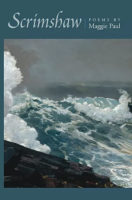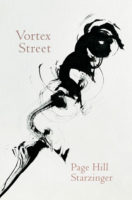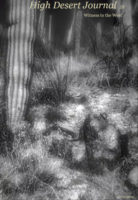petrichor is extending its submission deadline to May 1st. Send us your vispo, your twists, concrete distractions, code tomes, and sound signs. Now accepting apocalypse writings. Get weird with it. petrichormag.com
Our Haunted Past: On Molly McCully Brown’s Virginia State Colony for Epileptics and Feebleminded
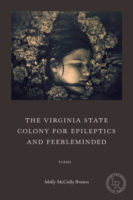 Guest Post by Kelly Williamson
Guest Post by Kelly Williamson
In her remarkable debut, The Virginia State Colony for Epileptics and Feebleminded, Molly McCully Brown revisits the history of a state-run institution that sterilized patients without their consent, offering readers the opportunity to confront the dark realities of the eugenics movement. With a documentary approach, Brown bases the poems on the historical evidence she gleans from archival research. Exploring the perspectives of the colony’s caretakers, and patients, Brown pays tribute to an unacknowledged chapter from our nation’s dark history.
This collection serves as evidence of Brown’s curiosity and bravery in facing what she considered unknown and scary. Similarly, it can be an act of discovery for the reader as well. Readers might be alarmed to come across such wreckage that they once failed to notice. However, Brown invites readers to understand, rather than rebuking them for not knowing. Brown’s collection reminds us that poetry builds empathy that can raise the awareness needed to foster change.
Readers may have never heard of the Virginia State Colony for Epileptics and Feebleminded, a blind room, or known of the sterilizations posed as appendectomies in the state-run institution located in Virginia. Brown’s book allows readers to recognize that this lack of knowledge is a privilege, for the painful history that took life away from innocent girls is a history that must be known. Although much has changed, these poems can encourage us to understand ways in which our current society can do better. While it’s easy for readers to see the title and feel far removed from history, this collection of poems works to close that gap of separation, to use these imagined patients as windows into a haunting past.
The Virginia State Colony for Epileptics and Feebleminded by Molly McCully Brown. Persea Books, 2017.
Reviewer bio: Kelly Williamson is a senior at Loyola University Maryland minoring in writing. She has published poems in her school’s literary magazine, Corridors.
Relevant Reading for Everyone
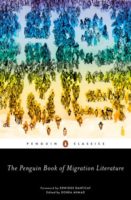 Guest Post by Serenity Schoonover
Guest Post by Serenity Schoonover
As 68.5 million people currently live as displaced persons on the planet, a short, potent anthology on immigration, emigration, and asylum-seeking is relevant reading for everyone. The Penguin Book of Migration Literature: Departures, Arrivals, Generations, Returns showcases thirty writers’ artful examinations of striking out to start over, staying put despite instability, and even circling back to a country that disowned you.
Among established writers, Emine Sevgi Özdamar’s “The Bridge of the Golden Horn,” notes the wry negotiations of Turkish factory women in Germany: “the man made meatballs out of horses- we didn’t know that, because we couldn’t speak German. Meatballs were our mother’s favorite food.” Another, from Mehdi Charef’s “Tea in the Harem,” examines the volatile relationship between an Algerian mother and her son in France, both caught in the cross-hairs of identity crisis, “between two cultures, two languages, and two colors of skin.”
Emerging writer Djamila Ibrahim’s story, “Heading Somewhere,” laments an Ethiopian man’s marriage of convenience, a relationship based on leverage rather than love: “he resented Marianne her power. Divorce meant the loss of his permanent resident card, maybe even deportation.” Most unforgettable in the collection is Warsan Shire’s prose poem, “Conversations about Home (From the Deportation Center),” which begs the question: “Do you know how difficult it is, to talk about the day your own city dragged you by the hair?”
The power of this anthology, edited by Dohra Ahmad with a foreword by Edwidge Danticat, is its potential to be the first in a line of future works, literature that is willing to discuss, rather than dismiss or demonize, “people with deep histories-individuals as well as collective- that predate the migration, rather than newly created humans whose lives begin in a boat, plane or desert crossing.”
The Penguin Book of Migration Literature: Departures, Arrivals, Generations, Returns edited by Dohra Ahmad. Penguin Random House, September 2019.
Reviewer bio: Essays by Serenity Schoonover have aired on NPR, with book reviews appearing in Split Rock Review, Women’s Independent Press, CALYX, The Bookends Review, among others.
Buy this book through our affiliate Bookshop.org.
Call :: Pensive: A Global Journal of Spirituality and the Arts Issue 1
Submit by May 15 to the inaugural issue of Pensive, an interfaith global journal based at Northeastern University in Boston. Original poetry, prose, visual art, film, music, and translations welcome. Especially interested in work that deepens the inward life; envisions a more just, peaceful, sustainable world; and advances dialogue across differences. Submissions by global and historically underrepresented groups particularly encouraged. Submit up to 5 pieces; simultaneous submissions and previously published works welcome. Send documents in 12 point Times New Roman with a brief (3-5 line) contributor’s bio in third person to pensivejournal@gmail.com. Email Alexander Levering Kern, co-editor, with questions.
Contest :: Swan Scythe Press 2020 Poetry Chapbook Contest
 Swan Scythe Press is now considering manuscripts for its 2020 Poetry Chapbook Contest. Submit a manuscript of 20-32 pages of poems that includes a title page with author’s name, address, phone number, and email address and a second title page without personal identifiers, book title only. Manuscripts can be mailed to 1468 Mallard Way, Sunnyvale, CA 94087 or submitted online, visit swanscythepress.submittable.com/submit. Entry fee is $18.00 payable to Swan Scythe Press. Deadline is June 15th. Winner receives $200 and 25 perfect-bound chapbooks. For full guidelines and details, please visit www.swanscythepress.com.
Swan Scythe Press is now considering manuscripts for its 2020 Poetry Chapbook Contest. Submit a manuscript of 20-32 pages of poems that includes a title page with author’s name, address, phone number, and email address and a second title page without personal identifiers, book title only. Manuscripts can be mailed to 1468 Mallard Way, Sunnyvale, CA 94087 or submitted online, visit swanscythepress.submittable.com/submit. Entry fee is $18.00 payable to Swan Scythe Press. Deadline is June 15th. Winner receives $200 and 25 perfect-bound chapbooks. For full guidelines and details, please visit www.swanscythepress.com.
Green Mountains Review Launches Social Distance Reading Series
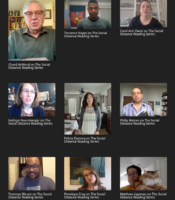 Literary magazine Green Mountains Review has partnered with the Vermont School to highlight writers whose book launches have been “snuffed out” by the COVID-19 pandemic.
Literary magazine Green Mountains Review has partnered with the Vermont School to highlight writers whose book launches have been “snuffed out” by the COVID-19 pandemic.
They post new videos to their Social Distance Reading Series twice a week on Wednesday and Sunday so that authors can read from their newly released collections of poetry. Right now the focus is on writers whose book events were cancelled in the months of January through May.
You can currently find readings by Chard deNiord, Kathryn Nuernberger, Felicia Zamora, Philip Metres, Tommye Blount, Penelope Crazy, and Matthew Lipman.
Wade in the Poems of Maggie Paul
Maggie Paul’s Scrimshaw gifts us with superbly crafted poems of graceful statement and gentle wisdom. I sense here a soul making peace with the near past and distant past as the speaker recollects mother, father, children, a lover, and others. Paul writes in “Linguistics,” a poem about some unspecified but insurmountable conflict between lovers: “So much goes on beneath / the surface that the tide never washes up.” Conflicts here are discreetly remembered and slantly alluded to. This is an approach I particularly admire as it counters much of the graphic rhetoric of pain we see in poems today.
A water motif runs through many of the poems, referencing ponds, streams, and the sea. There is both delight and melancholy in these poems, and the melancholy glows as burnished gold. Take for example the opening lyric “Trochilidae.” The poem compares a diminished girl to a tiny fragile bird who comes to “bring fire to the world.”
One of my favorite poems in the collection is “Watershed,” a metaphysical poem about the flow of life and time. This prose poem tumbles forth in a rush of figurative language describing the flow of water, which is “fragrant as a season, forthright as a calendar.” Paul has the ideal sense of an ending, landing her poems neither too definitively, nor too ambiguously. In “Looking Back,” a poem about doubt and written in a series of couplets that capture paradoxes and contradictions, she writes, “We thought we came for one thing / but really came for another.” The lyric ends, “And that thing we would have died for? / We’ll not die for it again.” These are poems of wise beauty. Wade in them.
Scrimshaw by Maggie Paul. Hummingbird Press, 2020.
Reviewer bio: Lynn Levin’s most recent book is the poetry collection The Minor Virtues (Ragged Sky, 2020).
Terrain.org – April 2020

New on Terrain.org: fiction by Kelly K. Ferguson; nonfiction by Kristen Munson, Désirée Zamorano, Julian Hoffman, John T. Price, and Naomi Cohn; and poetry by William Woolfitt, Jon Davis, Cynthia Neely, John Saad, Jen Karetnick, Cate Lycurgus, Jennifer Bullis, and Cameron McGill.
Call :: the tiny journal iii
Deadline: June 1, 2020
Feeling quarantined and alone? Come connect with us! We are an annual online lit mag looking to publish beautiful works of micro-fiction, short poems, and flash nonfiction for issue iii. We are especially interested in works grappling with the challenges of our current times. Navigate to our website, www.thetinyjournal.org, for submission details.
Call :: Jay Lit Review Issue 1
Deadline: Rolling
Jay Lit Review call for critiques, commentary, research, essays, and translations. Fields of interest: African (youth) literature and literacy; African (youth) culture and language studies; African language education; feminist/gender, post/decolonial, reader-response, linguistic, comparative, etc. analysis; translation into/from African languages; related areas of study. Topics: African youths, youth culture and literature; reflections on teaching African languages; multilingualism in Africa, linguistics, related subjects. Educators, academics and translators invited to showcase knowledge and skills in their professional field. Postgrad essays on a variety of African youth concerns will be considered. Double-blind peer review. Visit africanyouthliterature.art.blog/the-jay-lit-review for more info. Email africanyouthliterature@gmail.com.
Apple Valley Review – Spring 2020
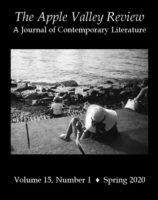
Featuring new fiction from Timothy Kenny and poetry from Francesca Gargallo (translated from the Spanish by Dana Delibovi), Carol V. Davis, Robert L. Penick, Débora Benacot (translated from the Spanish by Margaret Young), Eric Stiefel, Trina Gaynon, Stan Sanvel Rubin, and Gail Peck. Cover photograph from Brooklyn by Solomon Laker. More info at the Apple Valley Review website.
American Poetry Journal – 2021
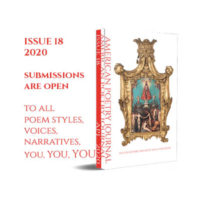
The latest issue of American Poetry Journal features work by Terrance Hayes, Philip Metres, Adriana E. Ramírez, Jenn Givhan, Trace DePass, John Sibley Williams, Cassidy McFadzean, Darby Lyons, and more.
Call :: Journal of African Youth Literature Issue 2
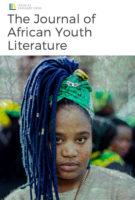 Journal of African Youth Literature issue 2 call for submissions of creative writing and artworks open now. Poetry, fiction, visual stories, plays, essays. Artworks of all kinds, including front cover. Criteria: Must be created by, about and/or for African youths (15-35 years). ‘African’ definition is, generally, born-in-Africa and of African heritage. Includes the diaspora, and not related to race or colour. Our mission is ‘Preserving African Youth Identities’ through creative expression. Visit africanyouthliterature.art.blog for more info. Email africanyouthliterature@gmail.com. See issue 1 at bit.ly/2SxiOI8.
Journal of African Youth Literature issue 2 call for submissions of creative writing and artworks open now. Poetry, fiction, visual stories, plays, essays. Artworks of all kinds, including front cover. Criteria: Must be created by, about and/or for African youths (15-35 years). ‘African’ definition is, generally, born-in-Africa and of African heritage. Includes the diaspora, and not related to race or colour. Our mission is ‘Preserving African Youth Identities’ through creative expression. Visit africanyouthliterature.art.blog for more info. Email africanyouthliterature@gmail.com. See issue 1 at bit.ly/2SxiOI8.
Focus on Flowers
With the weather warming up, I see new green sprouting in my backyard daily. This seems like a good time to focus on poems about flowers found in the Spring 2020 issue of Colorado Review.
In “Bloom,” Emily Van Kley’s speaker talks to the forsythia plant “beside the house.” Together, they move through the seasons: gray in winter, blooming in summer just for the blooms to quickly disappear into leaves. Van Kley’s images are beautiful and strong with lines that really pulled at me, like “The sadness that carries / my thoughts close to its chest / will unpack it’s summer / wardrobe,” and “Soon the last rains // will poor themselves down / storm sewers’ gullets.”
Leah Tieger also writes of flowers in “Five Sunflowers,” which are a gift from “the man who loves me.” The flowers “turn the room from real / to magazine, so picture my life perpetually happy.” The flowers urge the speaker to be grateful, “if not for your presence, / at least for the hands that brought you.” The piece feels warm and loving, the same “brilliant / and saturated” yellow of the flowers.
Welcome in spring and some much needed color with these poems from Colorado Review.
Alaska Quarterly Review Moves Temporarily to Online-only Submissions
Due to the necessity of social distancing in this time, Alaska Quarterly Review will no longer be able to review hard copy submissions to the journal. But don’t fear, they are still accepting online submissions through Submittable. Poetry submissions are being accepted through April 16 and nonfiction submissions will be open from April 17 to 30. They do charge a $3 fee.
Also, don’t forget to pick up a copy of their Spring 2020 issue which includes a special feature “Carrying the Fire: Celebrating Indigenous Voices of Canada.”
Carve Spring 2020 Preorder Week
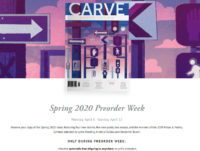 That’s right! This week is the week you can preorder Carve Magazine‘s Spring 2020 issue. From now until April 12, you can reserve your copy of the special print edition and receive automatic free shipping to anywhere on print preorders. You also get 15% off a 1-year print or digital subscription. Need more reasons to preorder this issue? It features four new stories, five new poets, two essays and the winners of the 2019 Prose & Poetry Contest selected by Lydia Kiesling, Analicia Sotelo, and Benjamin Busch.
That’s right! This week is the week you can preorder Carve Magazine‘s Spring 2020 issue. From now until April 12, you can reserve your copy of the special print edition and receive automatic free shipping to anywhere on print preorders. You also get 15% off a 1-year print or digital subscription. Need more reasons to preorder this issue? It features four new stories, five new poets, two essays and the winners of the 2019 Prose & Poetry Contest selected by Lydia Kiesling, Analicia Sotelo, and Benjamin Busch.
Exploring Loss with Page Hill Starzinger
In Page Hill Starzinger’s Vortex Street, the poet explores many different kinds of loss, to resist squandering what is given. In her revisions of complicated grief, she takes up the subjects of unborn children, the ending of fertility, and becoming an orphaned adult after the death of parents. The fleeting life cycle of a mayfly which only endures for 24 hours is held against the cognitive decline of an aging father. In this act of ongoing “rentrayage” or remaking, the poet turns towards locating the quiet harbor where grief can be held—through the senescent body, its memories, and the exterior dwelling places that anchor us to the past.
Vortex Street by Page Hill Starzinger. Barrow Street Press, May 2020.
Reviewer bio: Shin Yu Pai is the author of AUX ARCS, Adamantine, Sightings, and Equivalence. In March 2020, Entre Rios Books published Ensō, a 20-year survey of her work across disciplines. For more info, visit www.shinyupai.com.
Contest :: Sandeen Prize for Poetry Deadline is April 30
The University of Notre Dame is accepting submissions to its Sandeen Prize for Poetry through April 30. This is open to poets who have published at least one full-length collection. $15 administrative fee. First place receives $1,000 and publication by the University of Notre Dame Press. Learn more…
Poetry – April 2020

The latest issue of Poetry features work by Michael Hofmann, Martha Sprackland, Harmony Holiday, Pascale Petit, Jeannine Hall Gailey, Gertrude Stein & Bianca Stone, Tishani Doshi, Madeline Gins, Joy Ladin, Emily Jungmin Yoon,Sumita Chakraborty, Katie Pyontek, Sun Yung Shin, Torrin A. Greathouse, Sally Wen Mao, Lucy Ives, Shane Neilson, Nelly Sachs, Ocean Vuong, and more. Plus, an essay by Joy Ladin.
Call :: The Red Wheelbarrow Wants Work for Summer 2020 Issue
Formerly known as Red Savina Review, The Red Wheelbarrow Review is set to to debut its first issue under the new name this month. Don’t forget that they are still on the hunt for poetry, short fiction, and creative nonfiction where “word meets spirit in a commingling of the sacred and mundane.” Submissions accepted on a rolling basis. $3 fee. They also offer an expedited response option. Learn more…
Contest :: KAKALAK 2020
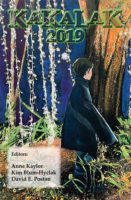 Deadline: May 18, 2020
Deadline: May 18, 2020
SUBMISSION GUIDELINES apply to both poetry and art. Anyone can enter. Goal: We’re looking for work that evokes the SPIRIT of the Carolinas from the Outer Banks and Low Country to the Piedmont and Appalachia. Submission Period: March 1—May 18, 2020. Entry fee: $12 for 1-3 poems or 1-3 images. All entries considered for publication. All contributors will receive one copy for each item selected for publication. Prize money ranges from $300 to $20. Details can be found on the Kakalak contest page of the www.MainStreetRag.com website.
Plume – April 2020
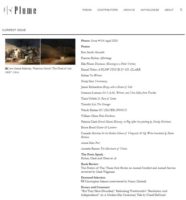
The April issue of Plume is out. This month’s featured selection: Christopher Salerno interviewed by Nancy Mitchell, with work by the poet included. Chad DeNiord in the essay & comment section. Mark Wagenaar reviews three new books on armed conflict and armed service.
The Massachusetts Review – Spring 2020
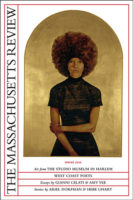
The Spring 2020 issue includes poetry by Desirée Alvarez, Danusha Laméris, Julie Murphy, Nancy Miller Gomez, Charlie Peck, Cynthia White, Keith Leonard, Augusta Funk, and more; fiction by Sylvia Hanitra Andriamampianina, Karin Cecile Davidson, Tad Bartlett, Gabriella Kuruvilla, Hebe Uhart, Jung Young Moon, and others; and nonfiction by Gianni Celati, Lesley Wheeler, Amy Yee, and Melanie McCabe.
Call :: Gold Man Review Seeks West Coast Work
Deadline: June 1, 2020
Gold Man Review, a West Coast Journal, is currently looking for submissions in poetry, fiction, and nonfiction for Issue 10. We are open to all topics and themes and love writing that pushes boundaries. If your work is on the unusual side, then we’re probably the journal for you. If you’re interested in submitting to Gold Man Review, please see our website for full submission guidelines. Please also note that we only accept submissions from writers in Oregon, Alaska, Hawaii, California, and Washington. www.goldmanpublishing.com
The Georgia Review – Spring 2020
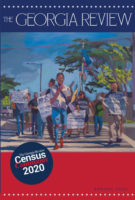
The Georgia Review‘s Spring 2020 issue presents authors’ and artists’ explorations of what it means to attempt representation of the diverse communities that comprise the United States. Special features include “Un-Redacted: A Census of Native Land,” a collection of writings by Native authors on the legacy of settler colonialism in the U.S.; a section on the internment of people of Japanese descent in North America during WWII; and dispatches from an innovative research project on prison labor in the post–Civil War “New South.” Art by Eddie Arroyo.
Call :: Transference Closes to Submissions on April 30
Don’t forget that literary magazine Transference officially closes to translations of poetry from (or inspired by) works originally written in Arabic, Chinese, Japanese, French, German, Latin, and Classical Greek on April 30. Submissions must be accompanied by commentary. They especially would like poetry on the themes of vision/seeing. They also would love to see essays on the translation of poetry. scholarworks.wmich.edu/transference/. Transference is peer-edited in a blind submission process. Published by the Department of World Languages and Literatures at Western Michigan University. Write to the editors at lang-transference@wmich.edu.
Colorado Review – Spring 2020
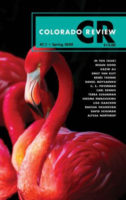
Featured in this issue of Colorado Review, find poetry by Jack Ridl, Amanda Gunn, and Yerra Sugarman; fiction by Alyssa Northrop; and nonfiction by David Schuman. Plus Raksha Vasudevan, Emily Van Kley, Leah Tieger, Gay Baines, Michael Homolka, Kazim Ali, Franco Paz, Laura Kolbe, Angie Macri, Benjamin Seanor, and many more. See other contributors at the Colorado Review website.
Cleaver Magazine
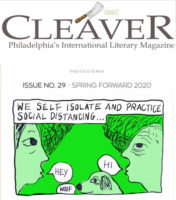
The newest issue of Cleaver features a visual narrative by Emily Steinberg; short stories by Catherine Parnell, Andrea Ellis-Perez, and others; flash by Uma Dwivedi, Kim Magowan, and more; and poetry by Marc Harshman, Jackie Craven, and more. Additional art by Serge Lecomte.
Call :: Storm Cellar Seeks Secrets, Treasures, Evidence, & Evocations
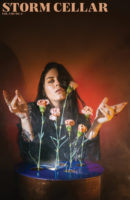 Storm Cellar, a journal of safety and danger since 2011, seeks amazing new writing and art for its summer issue. We especially encourage BIPOC, lgbtqia+, women and gender nonbinary, poor, neurodivergent, border-straddling, and other under-represented authors. Send secrets, treasures, evidence, and evocations: surprise us! Submission form at stormcellar.submittable.com.
Storm Cellar, a journal of safety and danger since 2011, seeks amazing new writing and art for its summer issue. We especially encourage BIPOC, lgbtqia+, women and gender nonbinary, poor, neurodivergent, border-straddling, and other under-represented authors. Send secrets, treasures, evidence, and evocations: surprise us! Submission form at stormcellar.submittable.com.
Contest :: 3rd Annual Marystina Santiestevan First Book Prize
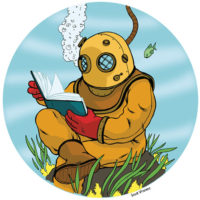 Deadline: June 30, 2020
Deadline: June 30, 2020
Our third annual first book prize is open and accepting manuscripts. If you have a smoking hot manuscript or know someone who does, please give us a shot. Awarded annually to a poet writing in English who has not yet published a full-length poetry book, the Marystina Santiestevan First Book Prize champions poets who dance to their own tune not to be different but to be true. Previously unpublished manuscripts of 48-90 pages should be submitted through our Submittable page or via the USPS. Please visit www.conduit.org/book-prizes for details.
Nimrod Extends Deadline for 2020 Literary Awards
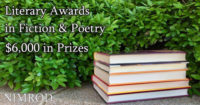 Extended Deadline: April 15, 2020
Extended Deadline: April 15, 2020
Submissions for The Pablo Neruda Prize for Poetry and The Katherine Anne Porter Prize for Fiction, with prizes of $2,000 and $1,000 and publication, have been EXTENDED to April 15th. Finalists and selected semi-finalists will be published and paid at a rate of $10/page. For poetry, submit 3-10 pages (one long poem or several short poems); for fiction, one story, 7,500 words maximum. Manuscripts may be mailed or submitted online: nimrodjournal.submittable.com/submit. Each entry must be accompanied by a $20 entry fee, which includes a one-year subscription. For more information and the complete rules, email nimrod@utulsa.edu or visit nimrod.utulsa.edu.
Palette Poetry’s Featured Favorites
 Looking for some good poetry to read during National Poetry Month? Visit Palette Poetry where Associate Editor Benjamin Bartu has put together a list of “Featured Favorites of 2019.” This list includes links to five different poems published on Palette throughout 2019, and he introduces each piece with a little insight on the editors’ feelings about them.
Looking for some good poetry to read during National Poetry Month? Visit Palette Poetry where Associate Editor Benjamin Bartu has put together a list of “Featured Favorites of 2019.” This list includes links to five different poems published on Palette throughout 2019, and he introduces each piece with a little insight on the editors’ feelings about them.
The list includes work by Márton Simon translated by Timea Balogh, Logan February, Julia C. Alter, Jaime Zuckerman, and Dorothy Chan. Visit the Palette website to learn more about each piece and then delve in and enjoy.
Arts & Letters Extends Deadline for 2020 Contest
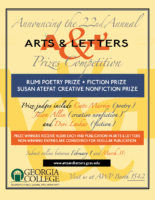 With all the craziness going on in the world, literary magazine Arts & Letters has extended the deadline to its Arts & Letters Prize. They are open to fiction, poetry, and creative nonfiction. $1,000 and publication awarded to a winner in each genre. The new submission deadline is April 15. $20 fee. Learn more…
With all the craziness going on in the world, literary magazine Arts & Letters has extended the deadline to its Arts & Letters Prize. They are open to fiction, poetry, and creative nonfiction. $1,000 and publication awarded to a winner in each genre. The new submission deadline is April 15. $20 fee. Learn more…
Poetry Offers April 2020 Issue Free During NaPoMo
 April is here, ringing in National Poetry Month. To celebrate the occasion, Poetry Magazine is currently offering a free download of the April 2020.
April is here, ringing in National Poetry Month. To celebrate the occasion, Poetry Magazine is currently offering a free download of the April 2020.
You can find the free issue in the Poetry Magazine App, available through the Apple App Store, Google Play, and Amazon.
Poets in this issue include Ocean Vuong, Emily Jungmin Yoon, Jeannine Hall Gailey, Gertrude Stein and Bianca Stone, Michael Hoffman, and plenty more. Go snag your free copy and spend the month celebrating the poems and poets you love.
Frontier Poetry New Voices Fellow 2020: Dujie Tahat
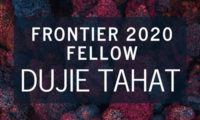 Frontier Poetry’s New Voices Fellowship is for uplifting and supporting “emerging poets from traditionally marginalized communities.” Congratulations to the newly announced Fellow for 2020: Dujie Tahat.
Frontier Poetry’s New Voices Fellowship is for uplifting and supporting “emerging poets from traditionally marginalized communities.” Congratulations to the newly announced Fellow for 2020: Dujie Tahat.
Tahat will receive a $500 grant, editorial guidance, the opportunity to read for Frontier, and publication of his work.
You can learn more about Tahat, listen to his podcast, and read recent work linked from the Frontier Poetry website.
A Speaker Readers Can Root For – Three Poems by Laurinda Lind
Three poems by Laurinda Lind can be found in Issue 29 of High Desert Journal: “When I Lived in Soda Springs, Idaho & I Had a Belly at the Bar,” “When I Lived in Soda Springs, Idaho & the Cashier at the Convenience Store Was Friendly to Me,” and “When I Lived in Soda Springs, Idaho & I Had Not Yet Killed a Black Widow Spider.”
This series of prose poems is strong in its storytelling. They read quickly with sentences that run on as if the speaker can’t wait to get the words out. The speaker is not the only person in these pieces. They all include other people the speaker interacts with, a cast of characters that Lind brings to life for us: her neighbor “who later stole several hundred dollars from me & nearly killed my cat,” the “old guy” who “wanted to buy us beers,” the friendly cashier who was “short & pretty” with “huge green eyes” and later robbed the store she worked at, and the man who calls her and harasses her over the phone.
There’s an edge to the writing, a take-no-nonsense attitude in every piece. The speaker is a woman who is surviving against the odds in this strange, unfamiliar place with people and animals who make living there difficult. Lind fleshes out a speaker who readers can root for.
Call :: Fleas on the Dog is Still Open for Issue 6
Reaching out takes many forms. We seek short fiction, poetry, plays, screenplays, and nonfiction for our upcoming Issue 6. You might be isolated but the world is at your keyboard—let’s connect. No, this isn’t a cheeky call like our previous ones. We don’t think that’s appropriate given the pandemic. But our enthusiasm and love of GOOD WRITING is unchanged and yes, we are still the crazy Dude Sextet. We want your junk and we want it now. See fleasonthedog.com for guidelines. Runs April 2-30.
Blackout by Burgess
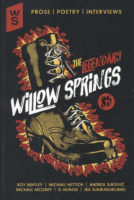 Magazine Review by Katy Haas
Magazine Review by Katy Haas
I’m a fan of reading and making blackout poetry, and the Spring 2020 issue of Willow Springs offers one piece of blackout by Jackson Burgess. What makes this a little more unique than other pieces of blackout I’ve read in the past is that Burgess blacks out his own poem.
On one page, readers can find a prose poem called “Medicine,” which details an almost nightmarish account of medical themes exploring a “lifetime trying to learn what another body needs.” On the next page, the prose poem is blacked out leaving only twelve words from the original piece. Dark and creative, I enjoyed the construction and deconstruction of Burgess’s work.
Contest :: Black Warrior Review Seeks Work for 2020 Writing Contest
Deadline: September 1, 2020
Biannual print journal Black Warrior Review seeks 2020 contest submissions. Winners will receive publication and cash prizes ($500 for flash and $1,000 for poetry, fiction, and CNF). Judges: Mayukh Sen (nonfiction), Paul Tran (poetry), C Pam Zhang (flash), and Lucy Corin (fiction). Open until 9/1. Submission fee: $20. Complete information available at bwr.ua.edu.
Contest :: Baltimore Review Wants Short Shorts for Summer Contest
Something new: No theme for our summer contest! Subject matter is entirely up to you. Surprise us. But keep it short. Three categories: flash fiction, flash creative nonfiction, prose poem. We want to be amazed at how you abracadabra a sprinkling of words into magic. And maybe be a little jealous of how you do that. One writer in each category will be awarded a $300 prize and published in the summer issue. All entries considered for publication. Total word limit for each category is 1,000. See www.baltimorereview.org for complete details. Deadline: May 31, 2020. Fee: $5.
24th Annual Poet Hunt Winners
 The winners of the 24th Annual Poet Hunt can be found in the Winter 2020 issue of The MacGuffin. Judge Richard Tillinghast introduces his selections and gives some insight about the winner and the two runners-up in the issue.
The winners of the 24th Annual Poet Hunt can be found in the Winter 2020 issue of The MacGuffin. Judge Richard Tillinghast introduces his selections and gives some insight about the winner and the two runners-up in the issue.
Winner
“The Sketchbooks of Hiroshige” by Jane Craven
Honorable Mentions
“Sonnet from the German Front, 1944” by Jill Reid
“Aergia in the Overworld” by John Blair
The 2020 contest opened for submissions today and will run until June 15. Winners receive publication and a $500 grand prize. Visit The MacGuffin’s website to learn more.
Event :: Summer Writers Institute Celebrates 25 Years
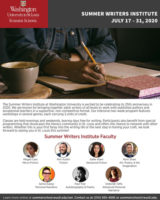 Registration Deadline: July 16, 2020
Registration Deadline: July 16, 2020
Event Dates: July 17 – July 31, 2020; Washington University in St. Louis
The Summer Writers Institute is excited to celebrate its 25th anniversary in 2020. We are known for bringing together adult writers of all levels to work with published authors and exceptional teachers in a supportive, non-competitive format. Our intensive two-week program features workshops in fiction, micro-fiction, poetry, and personal narrative. Whether this is your first foray into the writing life or the next step in honing your craft, we look forward to welcoming you in St. Louis this summer! summerschool.wustl.edu/summer-writers-institute
Contest :: The Orison Chapbook Prize 2020
The 2020 Orison Chapbook Prize is open for submissions of 20–45 pages in any literary genre (poetry, fiction, nonfiction, or hybrid) from April 1–July 1. Orison Books founder and editor Luke Hankins will judge. The winner will receive $300 and publication by Orison Books. Entry fee: $12. For complete guidelines, see www.orisonbooks.submittable.com.
Call :: BALLOONS Lit. Journal Seeks Work to Bring Warmth to Young Readers
Deadline: April 11, 2020
Many parts of the world have shut down under the threats of COVID-19. Schools are suspended, gatherings are discouraged. In this difficult period of time, BALLOONS Lit. Journal is seeking poetry, short stories, and artwork that brings warmth to our young readers. Works may praise the medical officers, mourn for the deceased, encourage the infected, cheer up the children staying home, show support to educators, reflect love and humanity or anything that brings out positive energy, the energy everybody needs now. Visit www.balloons-lit-journal.com for submission details. Stay healthy, stay happy!
Ruminate – Issue 54
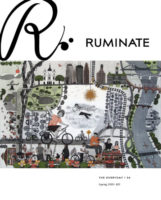
“The Everyday” issue celebrates Ruminate‘s focus on finding the sacred within everyday moments and routines. This issue features work from our 2019 Broadside winner Meredith Stricker, as well as the winning pieces from our 2020 VanderMey Nonfiction Prize written by Jasmine V. Bailey, Kelly J. Beard, and Atash Yaghmaian chosen by judge Brianna Van Dyke. Also in this issue: Erin Malone, Chelsea Dingman, Sneha Subramanian Kanta, Nick Yingling, Alyse Bensel, Daniel Seth Kraus, Andrew Huot, Stacy Trautwein Burns, and more.
New England Review – 41.1
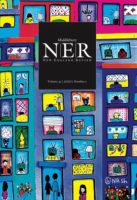
In this issue of New England Review you’ll find fiction by Maud Casey, David Allan Cates, Nandini Dhar, Elin Hawkinson, Christine Sneed, and Lindsay Starck; poetry by Su Cho, John Freeman, Rodney Gomez, Zach Linge, Vandana Khanna, Joanna Klink, Philip Metres,, Maura Stanton, Emily Jungmin Yoon, and more; nonfiction by Kazim Ali, Jennifer Chang, Ching-In Chen, Julia Cohen, and others; and Max Frisch in translations, translated by Linda Frazee Baker. Plus cover art by Brian Nash.
Event :: Driftwood Press Erasure Poetry Seminar
Event Location: Online Only
Application Deadline: April 30, 2020
Applications are now open for the “Erasure Poetry” seminar! This seminar is offered completely online. The “Erasure Seminar” is perfect for poets looking to explore the history and techniques behind erasure poetry. Deadline to join is April 30th, and all students will be admitted on a first come, first served basis.
Gargoyle – No. 71

Check out the new issue of Gargoyle. Contributors include: Laura Arciniega, Paula Bonnell, Sarah Browning, Michael Casey, Grace Cavalieri, Patrick Chapman, Bonnie Chau, Katie Cortese, celeste doaks, Gabriel Don, Cornelius Eady, Blair Ewing, Abby Frucht, Patricia Henley, George Kalamaras, Louise Wareham Leonard, Trish MacEnulty, Franetta McMillian, Tony Medina, Nancy Mercado, Susan Neville, A.L. Nielsen, Josip Novakovich, James J. Patterson, bart plantenga, Bern Porter, Doug Rice, Jane Satterfield, Davis Schneiderman, Claire Scott, Gregg Shapiro, Rose Solari, Maya Sonenberg, Marilyn Stablein, Susan Tepper, Michael Waters, and many more.
The MacGuffin

Discover a new issue of The MacGuffin. Volume 36 Number 1 spotlights the winners of our 2019 Poet Hunt Contest as selected by guest judge Richard Tillinghast. Jane Craven’s first place “The Sketchbooks of Hiroshige,” begins on p. 74, followed by our two honorable mention poets, Jill Reid and John Blair. This issue’s prose selections include Lucy Mihajlich’s “When I Infiltrated IKEA, They Greeted Me at the Door” and Teresa Milbrodt’s “Playing Krampus.” Featured artist Alison Devine graces the book’s inside and outside with a stroll through the Hamilton, Ontario countryside.
Call :: The Revolution (Relaunch) Wants Your Creative Activism
Deadline: Rolling
Founded in July of 2019, The Revolution (Relaunch) is a creative resurgence of Elizabeth Cady Stanton’s 1868 publication, The Revolution, which was the official newspaper of the National Women’s Suffrage Association. Like any good 19th century newspaper (or any good 21st century zine), we publish a range of styles—memoir, poetry, cultural criticism, interviews, and profiles featuring activists and grassroots organizations. Our focus is feminism in the broadest sense—in other words, we’re interested in “creative activism” that voices the marginalized and/or criticizes corrupt authority. Submit one piece of prose under 750 words, three poems, or 5 images to therevolutionrelaunch@gmail.com.

